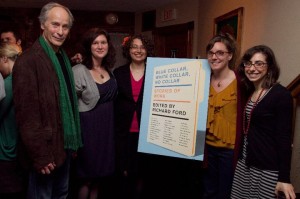Welcome to 826michigan’s tenth anniversary! In 2015, we’re celebrating ten years of 826michigan by highlighting ten people who have significantly shaped our organization since 826michigan opened its doors in 2005. Follow along with former 826michigan Communications Coordinator Amy Wilson this year as she explores how the contributions of many individuals have contributed to 826michigan’s evolution: from a tiny operation to a full-fledged nonprofit organization serving over 3,000 young people in Detroit, Ypsilanti, and Ann Arbor.
2010
“Writing books is fairly isolating; we do it alone in rooms where we spend a great deal of time sitting still. 826michigan puts me in the game, in the cohort, clarifies the goal, lets me see the outcome each and every time I show up.”
***
As we’ve seen these past few months in an ongoing series of short essays from GOOD, individuals are attracted to 826michigan’s work for many reasons. Some get involved because they are invested in education and equality, for some it’s the community service aspect, for many it’s a way to make friends and meet good people. Nearly everyone who loves 826michigan, though, has something in common: we love books, we love stories, we love writing. This is our uniting passion.
There are a great deal of writers of all kinds milling around the ranks of 826michigan’s volunteers and supporters. Many of them, including myself, are driven to understand writing in terms of community. To bring our writing outside of our brains, to give it life, to use it to spark a greater love for writing in others. To use writing as a tool. To make writing work – for ourselves and for others. This is what 826michigan does for us.
Richard Ford is a novelist of both critical (Pulitzer Prize, PEN/Faulkner Award) and popular acclaim, having authored the beloved Bascombe novels and the New York Times-bestselling Canada. In 2010, 826michigan partnered with Mr. Ford as he edited a collection of short stories, Blue Collar, White Collar, No Collar: Stories of Work. Released in 2011, with proceeds benefitting 826michigan, this collection gathers thirty-two stories on the theme of, touching on, inspired by, motivated by, work of all kinds. As we worked with Mr. Ford, preparing for the release of this anthology and for his appearance with Jeffrey Eugenides at our 2011 Storymakers Dinner, he revealed himself to be a true supporter of and enthusiast for our work.
This month, in honor of 826michigan’s tenth anniversary, I have something very special to share with you: a brand-new short essay by Richard Ford.
***
I came to Michigan (and Michigan State) from Mississippi, in 1962. Where I’d lived there were no factories, no unions; there’d been no exodus of citizens migrating in just for a chance at a good job. Michigan then, and since World War II, was also a particular destination for Eastern Europeans who were fleeing one kind of oppression or other, and who were also coming to work — building cars so many of them. I’d never really thought about the saving virtue of a good job, and about how much had had to happen in America so that everybody could have a shot at one. At that time there were strikes, job actions, the language of the unions was much in the air. Jobs, work, steady pay were a kind of ethical and moral bottom line in the civilization — especially in Michigan. An unassailable good worth fighting for. This was immensely imprinting on me. Of course I’d been almost criminally naive about such matters hidden away in the South; but I was commensurately altered by what I could see a job meant, once I got to East Lansing. Obviously, long years later, that impression worked itself into the fabric of our Blue Collar project. It created a nice sense of intellectual completion to organize that book and write its introduction.

I flatter myself to think I’m empathetic, (One should probably be cautious of a person who thinks of himself as empathetic). But I tend to see children (vividly, since I’ve never had children) as versions of myself. I want good for them in more or less the ways I wanted good for my self when I was a child — and mostly received it. Also, I was not great at school. I was and am dyslexic, I performed poorly, I was problematic, a deportment offender, often in the principal’s office. What 826michigan does is to enlist the interests of young kids in pursuits I could probably have gotten interested in, myself, and therefore could’ve come away from my youth with a more expanded sense of possibility than I did leave with. My leaky memory has unfortunately not retained the precise Sistine Chapel moment when 826michigan and I made contact; but I’m certain I’ve gained more than I’ve given.
Well, in spite of saying that writing lets me contribute to the lives of unknown others, that sort of putative contribution constitutes a bit of a leap of faith. I want to contribute. Books contribute to my life when I read them. Maybe mine do. But it’s fairly indirect from where I see it. 826michigan is, on the other hand, quite direct — both as a direct way for me to contribute to the work lives and young learning lives of 826michigan’s staff and participants, and as a direct recipient of considerable satisfaction. Writing books is fairly isolating; we do it alone in rooms where we spend a great deal of time sitting still. 826michigan puts me in the game, in the cohort, clarifies the goal, lets me see the outcome each and every time I show up.
Telling one’s story, whether we publish what we write or write chiefly for ourselves, represents an important ability to synthesize and reconcile the disparate parts of one’s life (intellectual life, emotional life, jagged and ill-fitting life) into a whole the parts of which (importantly) fit.
When a person tells or invents a story about something that happened in the past (a typical story form) the completion of that story avers, for the writer, a kind of small triumph; it avers that whatever in the past might’ve been difficult, or dramatic, or hard to think clearly about, or hard to express — has now been successfully addressed and expressed. This expression-by-story represents a small triumph of the imagination, which in turn means not only that we’ve made something where before there was nothing, but also that even the most fractious difficulties can be submissive to our wit and intelligence. That’s always worth knowing.
***
Next month: a perspective from an incredible community advocate and former 826michigan staff member, Savannah Charles.
Amy Wilson is a writer living in New York City. From 2010-2014, she was a member of 826michigan’s staff.


